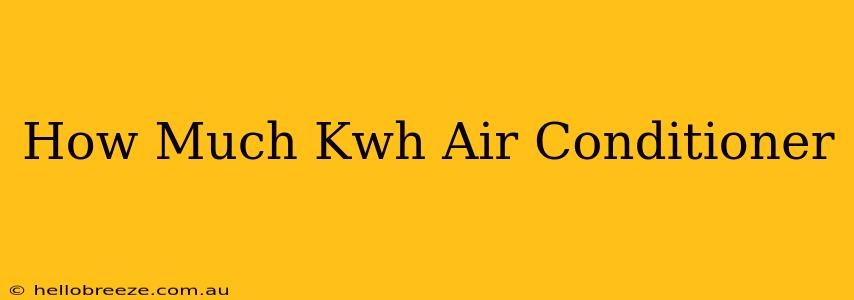Choosing the right air conditioner can significantly impact your energy bills. Understanding how much electricity your AC consumes, measured in kilowatt-hours (kWh), is crucial for making an informed decision and managing your energy usage effectively. This guide will break down the factors influencing AC energy consumption and help you estimate your potential kWh usage.
Factors Affecting Air Conditioner kWh Consumption
Several factors contribute to the amount of electricity your air conditioner uses. Understanding these will help you choose an energy-efficient model and optimize your usage.
1. AC Size and Type:
- BTU Rating: The British Thermal Unit (BTU) rating indicates the cooling capacity of your AC unit. Higher BTU ratings mean more powerful cooling, but also higher energy consumption. An appropriately sized AC for your space is key to energy efficiency. An oversized unit will cycle on and off frequently, wasting energy, while an undersized unit will struggle to cool the space effectively, also consuming more energy in the long run.
- SEER Rating: The Seasonal Energy Efficiency Ratio (SEER) measures the cooling output relative to the energy input. A higher SEER rating signifies greater energy efficiency. Look for units with higher SEER ratings (14 or above is generally considered good).
- Type of AC: Different types of air conditioners have varying energy consumption levels. Window units generally consume less energy than central air conditioning systems, which in turn can be less energy-intensive than portable units. Consider the best fit for your needs and space. Inverter AC units offer greater energy efficiency due to their variable speed compressors.
2. Energy Star Rating:
Look for the Energy Star label when purchasing an air conditioner. This certification indicates that the unit meets specific energy-efficiency guidelines, helping you save money and reduce your environmental impact.
3. Usage Habits:
- Temperature Setting: Setting your thermostat even a few degrees higher can make a noticeable difference in energy consumption. Consider using a programmable thermostat to automatically adjust temperatures when you're away or asleep.
- Running Time: The longer your AC runs, the more energy it consumes. Ensure your windows and doors are properly sealed to prevent heat from entering your space, reducing the overall running time needed.
- Maintenance: Regular maintenance, including filter changes and professional servicing, ensures your AC runs at peak efficiency, minimizing energy waste. A clogged filter restricts airflow, forcing the unit to work harder.
4. Climate and Insulation:
Your climate significantly influences AC energy usage. Hotter climates naturally require more cooling, leading to higher energy consumption. Proper home insulation plays a crucial role in reducing the cooling load on your AC, thus lowering your energy bills.
Estimating Your Air Conditioner's kWh Usage
Calculating the precise kWh usage of your AC requires considering several factors mentioned above. However, you can get a rough estimate using the following:
- BTU rating: Divide the BTU rating by 3412 to get the approximate wattage.
- Wattage: Multiply the wattage by the number of hours you use your AC daily.
- kWh: Divide the result by 1000 to obtain the approximate daily kWh consumption.
Example: A 10,000 BTU AC unit (approximately 3kW) running for 8 hours daily would consume around 24 kWh per day (3kW x 8 hours = 24000 Wh / 1000 = 24 kWh). Remember, this is a simplified calculation and doesn't account for the other variables influencing actual energy use.
Saving Energy with Your Air Conditioner
Beyond choosing an energy-efficient model, several strategies can help reduce your air conditioner's energy consumption:
- Regular maintenance: Clean or replace air filters regularly.
- Proper insulation: Ensure adequate insulation in your home to minimize heat gain.
- Strategic shading: Use blinds, curtains, or awnings to block sunlight.
- Smart thermostats: Use programmable or smart thermostats for optimized temperature control.
- Seal air leaks: Caulk and weatherstrip windows and doors to prevent air leaks.
By understanding how much kWh your air conditioner consumes and implementing energy-saving strategies, you can minimize your energy bills and contribute to a more sustainable lifestyle. Remember that this is just a guide, and professional consultation is always recommended for accurate assessments and personalized advice.

